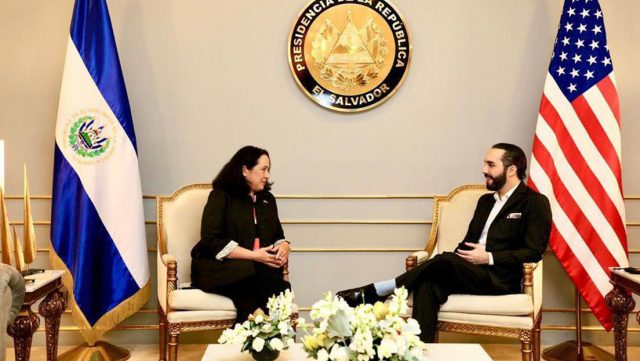Frictions between El Salvador and the US continue to increase. At the beginning of December, after the imposition of sanctions by the White House on various officials of the Nayib Bukele government, the Central American president has brought to light the alleged conversations that he held with the outgoing US Chargé d’affaires, Jean Manes.
«False accusations? Is it false that Jean Manes asked me to release Neto Muyshondt (captured in a video that gives tens of thousands of dollars to gang members)?», tweeted the Salvadoran president on Thursday, informed RT.
The dart went against Brian Nichols, the State Department’s undersecretary for Western Hemisphere Affairs, who claimed that Bukele made false accusations against Manes and the current Chargé d’affaires, Brendan O’Brien, to «distract the Salvadoran people from the corruption» in the presidency and damaging the relationship with the United States.
“We continue to be a close friend and ally of the Salvadoran people and we will continue working to promote the interests of the citizens of both countries. We welcome dialogue and a better relationship, but not at the cost of remaining silent in the face of harmful actions», said O’Brien.
The US decision against El Salvador marks a turning point in the relationship and opens a new chapter, with coercive measures involved, which calls into question the attempted rapprochement that the Biden administration made when it sent Jean Manes as negotiator, its «ideal choice» for the Central American country.
A failed mediation with Bukele
In May of this year, the controversial dismissal of five magistrates from the Constitutional Court and the Attorney General, Raúl Melara, by the majority of the official party which is ruling Parliament, provoked criticism from the Salvadoran opposition and the White House.
Although, until then, the relations between Bukele and Biden had not been idyllic, as they had been during the Donald Trump administration, the White House’s bet was to appoint Manes as Charge d’affaires to build a «bridge» with the Salvadoran administration. But it wasn’t the best move.
This week, Bukele accused Manes of having pressured him to make several decisions in his government, which he did not do. That refusal would have been decisive in severing the relationship with the diplomat, who announced in November that she would leave office because she did not see «interest» from El Salvador in improving relations with the United States.
Allegations of interference have been constant against Manes, although Bukele’s tweets this week were even more revealing. According to the president, the former Charge d’affaires made four requests: the release of Ernesto Muyshondt, a politician linked to criminal gangs, who is in prison; the non-reelection of Attorney General Rodolfo Delgado, currently in office; and the commitment «not to touch» the opposition leader Alfredo Cristiani and the former attorney general Douglas Meléndez. The fourth demand would have been «to stop the arrests of the people involved in the bonuses», an alleged corruption scheme that is being investigated by the Prosecutor’s Office.
For Bukele, these demands showed that there was interest, on the part of Washington, in interfering in the decisions of the State, and that the actions of his administration against crime did not have the support of the United States, something that was already taken for granted when the White House withdrew the financial support his administration received through USAID. The annoying point is that several investigations suggest that the historic reduction in homicides and violence in El Salvador would have its justification in a secret pact established between the government and the criminal gangs.
However, the president revealed that he had met earlier this week with Manes’ successor, Brendan O’ Brien, to express his interest in «repairing the relationship». The response of the White House, a day after that meeting, was the imposition of sanctions against senior Salvadoran officials for alleged dealings with leaders of the criminal gangs.
«Absolute submission»
While Biden’s administration ensures that the measures taken against El Salvador are to sanction the covert negotiations between Bukele officials and gang leaders, the Central American president maintains that the accusations are false and only have the interest of «subjugating» his government. .
“It is clear that the United States Government does not accept collaboration, friendship or alliance. It is absolute submission, or nothing. These daily accusations seem absurd. I didn’t know they were so interested in El Salvador. Perhaps what they are interested in is stopping the ‘bad example’ «, Bukele tweeted on Thursday.
Among those affected by these coercive measures are Osiris Luna Meza, vice minister of Justice and general director of Penal Centers of the Central American country; Carlos Amílcar Marroquín Chica, director of Reconstruction of the Social Fabric; and Luna’s mother, Alma Yanira Meza Olivares.
For Bukele, the interests of the United States in his country «have nothing to do with democracy», but in controlling the decisions of the allied countries. Likewise, he questioned that such attacks did not occur in the governments of his predecessors.
On his Twitter account, he wondered, «Why do they want us to go back in time? Why don’t they want us to grow? Why did they like it so much when those who kept us in poverty, violence and underdevelopment governed us?».


